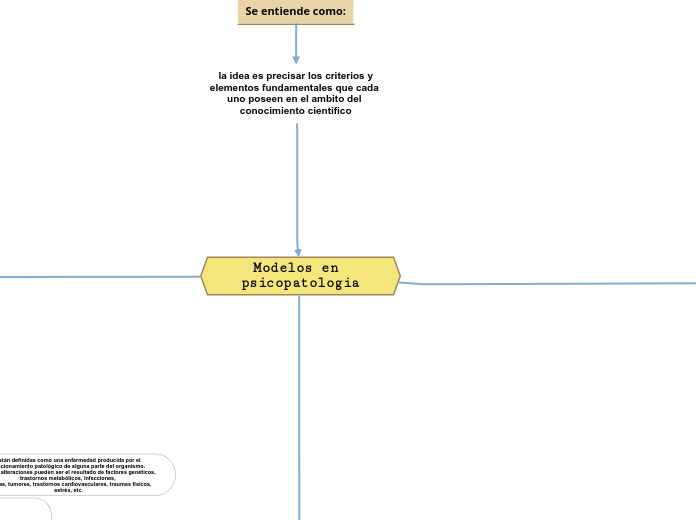by Laurent Molina 2 years ago
270
CONCEPTOS Y MODELOS EN PSICOPATOLOGIA

by Laurent Molina 2 years ago
270

More like this

To name your story, you have to think about the overall message and what you want your audience to understand from the story. Also, make it relevant and easy to remember.
The middle of the story is where you add layers of complications that will lead to the end. Reveal more about the character's journey. Did their personality go through changes? How did they overcome the challenges? And as you build up the story’s central conflict, make it more personal to that character. Also, from the middle act, you have to lead into the final act.
Your character(s) need(s) motivation in order to solve the challenge(s).
Desarrollo y principios de la perspectiva conductual
Secondary characters might also have motives that lead them to cross paths with the main character or which might trigger them to help the main character.
Se debe afirmar que la constitucion del modelo conductual sobre la condcuta anormal surgio de forma paralela a la modificacion de conducta
El modelo conductual como alternativa a las inadecuaciones de los modelos medicos (modelos de enfermedad)
Why does your character need to confront this challenge? What does he/she expect to accomplish by solving it?
See a few examples:
A finales de los años cincuenta se presentó una inconformidadbrespecto al modelo medico debido a factores teoricos, como lo son la metodologia y epitemologia
There wouldn't be any tension and excitement in your story if there weren't any obstacles in your character's way.
Conceptos basicos
hacen referencia a la cognición , es decir a la actividad mental humana y sus productos (conocimiento).
Desarrollos posteriores
En 1920 considerado como el manifiesto de la psicología conductista, Miller y sus colegas desarrollan la analogía mente-ordenador ( el cerebro no solo responde a estimulos sino que también procesa información) que incluye conceptos mentalistas tales como imagenes mentales, planes, metas, estrategias etc.
En la década de los cincuenta: la piscología conductista habiendo abandonado el positivísimo, el cual se consideraba la única vía posible para la ciencia. muchos psicólogos comenzaron a considerar que sus observaciones eran influenciadas bajo aspectos tan imprecisos cómo sus propias intenciones, ,motivaciones ,deseos o incluso teorías sobre que era digno de ser observado y que no (Bellosh 1987)
Antecedentes historicos
A story is nothing more than a character overcoming a series of difficulties to reach the desired goal. Obstacles usually create suspense and conflict. In overcoming obstacles, there is growth: weak becomes strong; hatred turns into love; sadness into happiness; wrong into right; lies into truth; or evil becomes good.
See a few examples below:
Each story has a main character and that character usually needs to solve a problem or challenge. The character's challenge is the one that creates tension throughout the story.
Evaluacion del modelo
Se han evidenciado muchos avances entre etos, los nuevos fármacos son por sí mismos además de elementos terapéuticos relevantes instrumentos de investigación sobre posibles causas biológicas del trastorno. La investigación sobre los aspectos neurofisiológicos y genéticos de la conducta anormal ha progresado con rapidez. Los tratamientos biológicos han proporcionado significativas aportaciones a la terapia de los trastornos mentales.
Postulados del modelo
Type in any other challenges which other characters in the story need to face.
Signo Sintoma Sindrome Enfermedad mental Dicontinuidad entre lo normal y lo anormal.
Bases biologicas de la conducta anormal
In most stories, there are 3 challenges. The number 3 is a mystical number symbolizing completeness. Try to come up with interesting challenges with which your character needs to struggle.
See a few examples below:
Están definidas como una enfermedad producida por el funcionamiento patológico de alguna parte del organismo. Dichas alteraciones pueden ser el resultado de factores genéticos, trastornos metabólicos, infecciones, alergias, tumores, trastornos cardiovasculares, traumas físicos, estrés, etc.
The ending of a story is essential. We all know that if the ending is weak, what happened before loses its importance. So make it unpredictable, but fair. A resolved ending answers all the questions and ties up any loose threads from the plot.
This is the closure section of the story.
See examples of possible outcomes below:
Try answering these questions to come up with a closure:
- Have all the problems been solved?
- Is there a clear picture of what happens with each character in the story?
- Has the challenge transformed your main character?
- How do the characters feel in the end?
In the beginning of the story (or the exposition), you will need to introduce the setting and characters. You might also want to introduce the main conflict. This part of the story is important because it gives the reader necessary background information and maybe even a first insight into a character’s personality.
The setting (time & place) of a story can change throughout the plot.
Your story can take place wherever your imagination will take you to.
For example: in an elevator, in an enchanted forest, etc. Don't forget to give details of the environment each time the setting changes, otherwise, the story can be confusing. Also, mention the seasons as each of them has unique weather and events.
Characters are essential to a good story. Usually, the protagonist(s) is/are the most affected by the plot. Introduce a character by focusing on their actions, interests, and occupation, as the physical appearance doesn't make a difference in most cases.
Type in the name of your character.